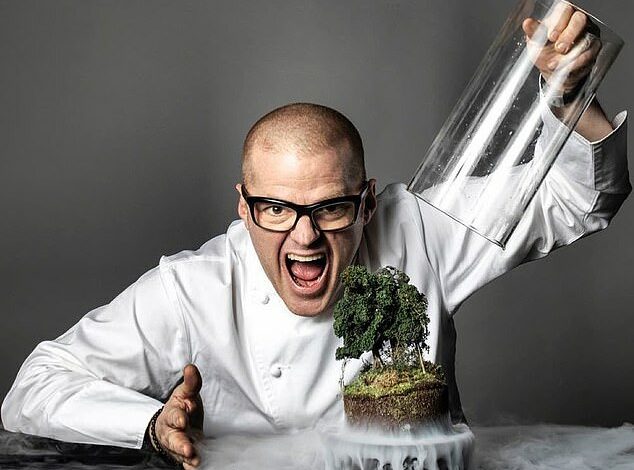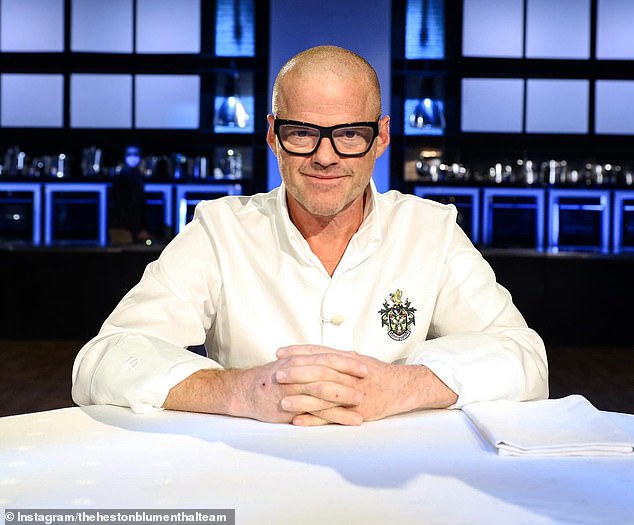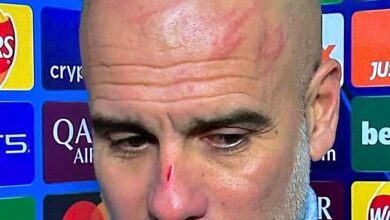Celebrity chef Heston Blumenthal reveals the first disturbing signs of the psychotic mania that landed him in the hospital for 3 weeks






Celebrity chef Heston Blumenthal has revealed the disturbing details behind the onset of the manic episode that led to him being hospitalised and eventually diagnosed with bipolar disorder.
In a revealing interview, the father of three described a series of “extreme highs,” hallucinations and suicidal thoughts — all of which were worsened when he slept for just an hour or two each night.
The worsening illness — which left Blumenthal hallucinating that “there was a gun on the table” — led to doctors admitting him to a psychiatric hospital in November last year, where he remained for 20 days.
The 58-year-old said his episode left him with a desire to “save the world” and “love everyone.”
He continued: ‘I was spewing ideas… I was so excited. Talking about making things. It was real mania.’

The celebrity chef is known for owning the Fat Duck in Bray, Berkshire, which has been awarded three Michelin stars and was previously listed in the World’s 50 Best Restaurants

The 58-year-old, who was also diagnosed with ADHD in 2016, recalls experiencing mental and physical changes during his crisis last October that were fueled by a desire to “save the world”
The celebrity chef was eventually diagnosed with bipolar disorder, a disorder characterized by at least one manic episode.
In bipolar II disorder, depressive episodes are more common.
About one in every 100 people will be diagnosed with bipolar disorder at some point in their lives.
Many people with the mental disorder go from one extreme to the other, experiencing depressive episodes where they feel very down and lethargic, and also suffering from mania where they feel ‘high’ and overactive.
However, unlike healthy mood swings, the extremes of bipolar disorder can last for several weeks, according to the NHS.
Blumenthal told the Financial Times He thinks he’s had bipolar disorder for ‘so long’.
He suggests that the insomnia he suffered early in his career, when he would send emails to colleagues before sunrise, may have been an early warning sign.
Reflecting on the mood swings he had developed over the past year, he described how he went from wanting to “love everyone” to getting angry if anyone so much as moved a post-it note.
“…and then boom – I got really angry at the world, I didn’t mince my words,” he said, comparing his mood swings to those of a child.
These feelings became more intense and he became an ’emotional danger to himself’ because of his suicidal thoughts.
According to doctors, the sleepless nights and state of excitement put potentially fatal stress on his body.
Blumenthal’s wife, entrepreneur Melanie Ceysson, described his moods as a “tornado.”
Ceysson recalls the moment she forced him to be admitted to hospital: “That was when I pressed the red button,” and she calls the aftermath “the most terrible hours” of her life.

Heaton explains: ‘Melanie made the difficult decision to have me have surgery, which meant I had to go under general anaesthetic’

The 58-year-old celebrity chef described the ordeal during an appearance on The One Show on Tuesday night, alongside Melanie

The 36-year-old wife of the Michelin-starred chef described her husband’s moods as a ‘tornado’ and worried he was a danger to himself
Blumenthal, who spoke at length about the “horrific” ordeal on The One Show in July, said: “These recurring highs and lows became increasingly strong and regular.
‘I was extremely high and had been for days. I had hallucinations, feelings of paranoia and even suicidal thoughts.’
He explained: ‘Melanie made the difficult decision to have me have surgery, which meant I had to be put under general anaesthetic.
“There was a knock on the door, a police officer came, then five firefighters came, then a doctor with an assistant and I thought, ‘What the hell is going on here?’ And then I saw the doctor pull out a big syringe and then I woke up in the hospital.”
The TV chef added: ‘Since my diagnosis I’ve learned a lot about myself and realised that a lot of my creativity is down to my bipolar disorder.
“I hope that talking about this condition can change the way we look at it and put it in the spotlight for the right reasons.”
While he doesn’t want to experience mania again, he admits he doesn’t regret the contribution milder episodes may have made to his earlier career.
Now he prioritizes sleep and says medication has stabilized his mood, meaning he can now develop his ideas.




